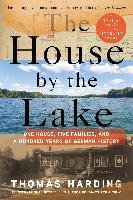Longlisted for the Orwell Prize
Named a Best Book of the Year by The Times (London), New Statesman (London), Daily Express (London), and Commonweal Magazine
In the summer of 1993, Thomas Harding traveled to Germany with his grandmother to visit a small house by a lake on the outskirts of Berlin. It had been a holiday home for her and her family, but in the 1930s, she had been forced to flee to England as the Nazis swept to power. Nearly twenty years later, the house was government property and soon to be demolished. It was Harding's legacy, one that had been loved, abandoned, fought over-a house his grandmother had desired until her death. Could it be saved? And should it?
When Harding began to make inquiries, he unearthed secrets that had lain hidden for decades about the lives of the five families who had lived there: a wealthy landowner, a prosperous Jewish family, a renowned composer, a widow and her children, and a Stasi informant. The house had been the site of domestic bliss and of contentment, but also of terrible grief and tragedy. As its story began to take shape, Harding realized that there was a chance to save it, but in doing so, he would have to resolve his own family's feelings towards their former homeland-and a hatred handed down through the generations.

